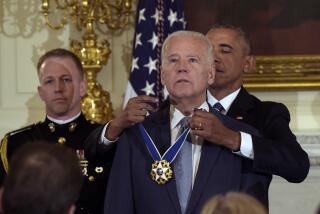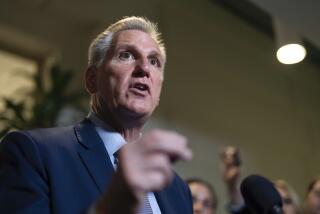In the GOP Family, a Feud of Presidential Proportions
- Share via
WASHINGTON — Forget the tension between President Bush and Democrats over taxes, spending cuts or hardball tactics in Congress.
Hands down, the most poisonous feud in Washington is the one between the White House and the man Bush beat for the Republican presidential nomination just more than a year ago: Sen. John McCain of Arizona.
Bush allies believe McCain is trying to broaden his national power base by systematically opposing the administration on several high-profile subjects: health care, gun control and, most prominently, campaign finance reform, the volatile issue the Senate will begin debating Monday. In return, McCain supporters believe the White House is determined to marginalize the senator’s influence and brand him as a pariah in the party.
The result is a cold war that has both sides predicting nothing but sustained conflict.
“We either have no relations on a good day or negative relations on a more routine day,” said John Weaver, McCain’s chief political strategist.
Probably not since Lyndon B. Johnson and Robert F. Kennedy tore at each other in the mid-1960s has a president been so openly, and consistently, at odds with the other leading national figure in his own party.
In the case of Bush and McCain, the ill feelings have reached the point where loyalists in both camps no longer exclude the possibility that the Arizonan could bolt the GOP in 2004 and seek the presidency as an independent.
Though McCain, 64, publicly dismisses the idea, another source close to him insists the increasingly open opposition from the White House and Senate GOP leadership may leave him no choice.
“If you close every door in the party, at some point he has to come to a hard decision about what he’s going to do,” said the source, who, like many, asked to remain anonymous when discussing the Bush-McCain conflict. “He’s less and less bound by any residual loyalties to the party.”
No Love Lost Between the Two
Bush and McCain are hardly personal friends; while the president has courted dozens of legislators in both parties, he and McCain haven’t spoken since a single meeting days after Bush’s inauguration.
Each side believes the other has failed to give it proper respect. McCain forces seethed earlier this year when Bush personally lobbied all the other leading sponsors of legislation to reform health maintenance organizations--but pointedly excluded McCain. Bush supporters see McCain indulging a craving for headlines that ignores a simple fact: It was Bush who won their riveting duel for the nomination and the presidency.
Still, neither principal seems gripped by the personal loathing that ignited the firefight between Johnson and Kennedy. “Nobody campaigned harder than I did for George Bush,” McCain said in an interview. “I have a cordial relationship with the president. It’s not as if we are at swords’ point.”
Indeed, hurt feelings and competing ambitions may explain less of the Bush-McCain conflict than more fundamental differences. The two men are divided by contrasting visions of how the GOP can build a stable national political majority.
While Bush puts great emphasis on solidifying the Republican base, McCain continues to insist that the party must court the independent voters who flocked to his primary campaign--usually with centrist reforms, such as his campaign finance bill.
But McCain’s approach is guaranteed to offend hard-core conservatives. “McCain is not representing some wing of the party, some public pulse or some grand issue,” charged Grover G. Norquist, a leading conservative strategist. “He is just representing McCain’s interest in being important.”
Still Working on Campaign Promises
Many around McCain say his actions so far this year can best be understood by recognizing that, like Bush, he is trying to execute campaign promises he made in 2000. McCain himself makes that point, saying, “I don’t think anyone would say, ‘McCain, you’re supposed to drop the things you campaigned for president on in deference to being a good Republican.’ ”
But in fact, that’s exactly how many Republicans feel.
“The problem is someone else won the election,” said one Senate Republican leader who asked not to be named when discussing a colleague. “The agent of change sits at 1600 Pennsylvania Ave., not on the second floor of the Russell Senate Office Building [where McCain has his office]. There’s an inherent conflict.”
Sen. Joseph I. Lieberman (D-Conn.), who has worked with McCain on several issues, offers a more sympathetic view. “He felt he returned to the Senate strengthened and he wants to make it count for something. People will tell you that it’s all about embarrassing Bush, but I don’t think so. He wants to get some stuff done.”
Regardless of the motives, McCain’s offensive to implement his campaign agenda is carrying him into collisions with Bush--and most of his Senate GOP colleagues--on a lengthening list of issues. Key among them:
* Campaign finance reform: In the measure he has co-sponsored with Sen. Russell D. Feingold (D-Wis.), McCain wants to ban unlimited contributions to the national parties. Bush, as he specified Thursday, would ban such contributions from unions and corporations but permit them for individuals--a fatal loophole, reformers believe. The McCain-Feingold bill also would go much further in trying to limit independent advertising campaigns from business and labor.
McCain said he was pleased by the tone of Bush’s comments Thursday concerning the reform issue: “He could have come out much harder, threatened a veto and talked about unacceptable provisions.”
But privately, McCain advisors believe the White House is trying to sink his legislation by promoting a less restrictive bill sponsored by Sen. Charles Hagel (R-Neb.), who, ironically, is one of McCain’s few close friends in the Senate.
Unless Bush reverses himself to accept a ban on soft money, his fight is virtually certain to escalate hostilities between the two men. If McCain wins the congressional fight to ban soft money but Bush vetoes the legislation, that would chill relations dramatically. Alternately, McCain is likely to be embittered if the White House and GOP leaders succeed in avoiding a ban on soft money.
* Gun control: McCain is working with Lieberman on compromise legislation to impose stricter requirements for background checks on handgun purchases at gun shows--an idea killed in the last Congress. The two men also will propose more funding for enforcement of existing gun laws, as gun rights advocates have urged.
The funding provision has done little to mollify conservatives who are angry that McCain is helping Democrats revive the gun show issue. Sen. Larry E. Craig (R-Idaho), when asked what McCain was up to with the bill, fumed: “Probably you would not want to see it in print.”
* Health care: McCain allied himself with Democratic Sens. Edward M. Kennedy of Massachusetts and John Edwards of North Carolina to introduce a patients’ “bill of rights” measure that would give consumers more freedom to sue health maintenance organizations. To the White House’s dismay, McCain joined the effort as Bush was trying to dampen support for the bill. McCain said he would have delayed the legislation’s introduction if the White House asked him. But on the core issue in the debate he is starkly at odds with the administration.
* Taxes: Contemptuous of Bush’s proposed tax cut during the campaign, McCain now is slowly moving toward open opposition to it. In recent interviews, he has echoed centrist Republicans, who argue that the cut should be linked to progress in reducing the national debt. And he has complained that the bill is tilted too much toward the wealthy.
White House Takes Hands-Off Approach
Faced with these looming conflicts, one Bush political advisor said the prevailing White House view is that the best way to deal with McCain is to not deal with him at all. “The best thing to do is not get entangled with him . . . and not treat him like an equal, which is almost what he wants,” the advisor said.
But ignoring a senator with such rare national visibility is likely to prove impractical as the various policy debates move forward. “Neither side is trying to find areas to work together,” one prominent Republican lamented. “This could get worse before it gets better.”
More to Read
Get the L.A. Times Politics newsletter
Deeply reported insights into legislation, politics and policy from Sacramento, Washington and beyond. In your inbox twice per week.
You may occasionally receive promotional content from the Los Angeles Times.











